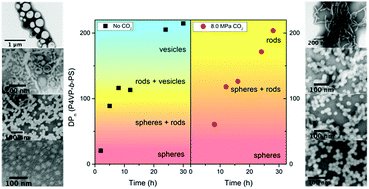Polymerization induced self-assembly: tuning of nano-object morphology by use of CO2†
Abstract
Polymeric nano-objects of non-spherical morphology (e.g. rods, vesicles) have a range of potential applications, and it is thus of great interest to develop synthetic approaches that enable large scale production as well as fine tuning of the morphology. To this end, we have developed reversible addition–fragmentation chain transfer (RAFT) dispersion polymerization in an alcoholic medium pressurized to low pressure (8.0 MPa) with CO2. It is demonstrated that the presence of CO2 has a profound effect on the morphology of the resulting polymer aggregates. In the presence of CO2, the formation of nano-objects with a high interfacial core/corona curvature is favoured relative to the corresponding system without CO2, e.g. rods are formed (with CO2) under conditions where vesicles (no CO2) would otherwise form. This is a convenient method for tuning the morphology without altering the recipe, and represents an attractive route to pure rod morphology, which is typically somewhat elusive.

- This article is part of the themed collection: Celebrating The Five-Year Anniversary of Polymer Chemistry

 Please wait while we load your content...
Please wait while we load your content...